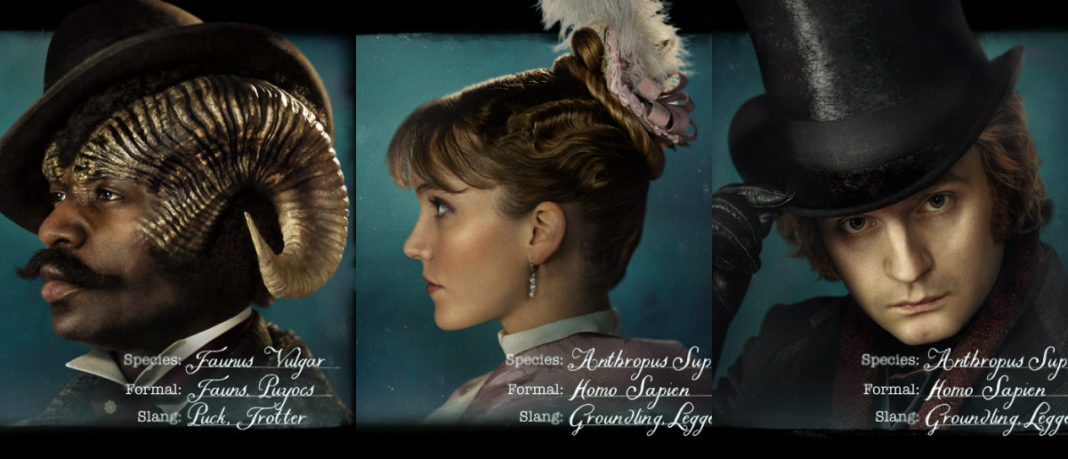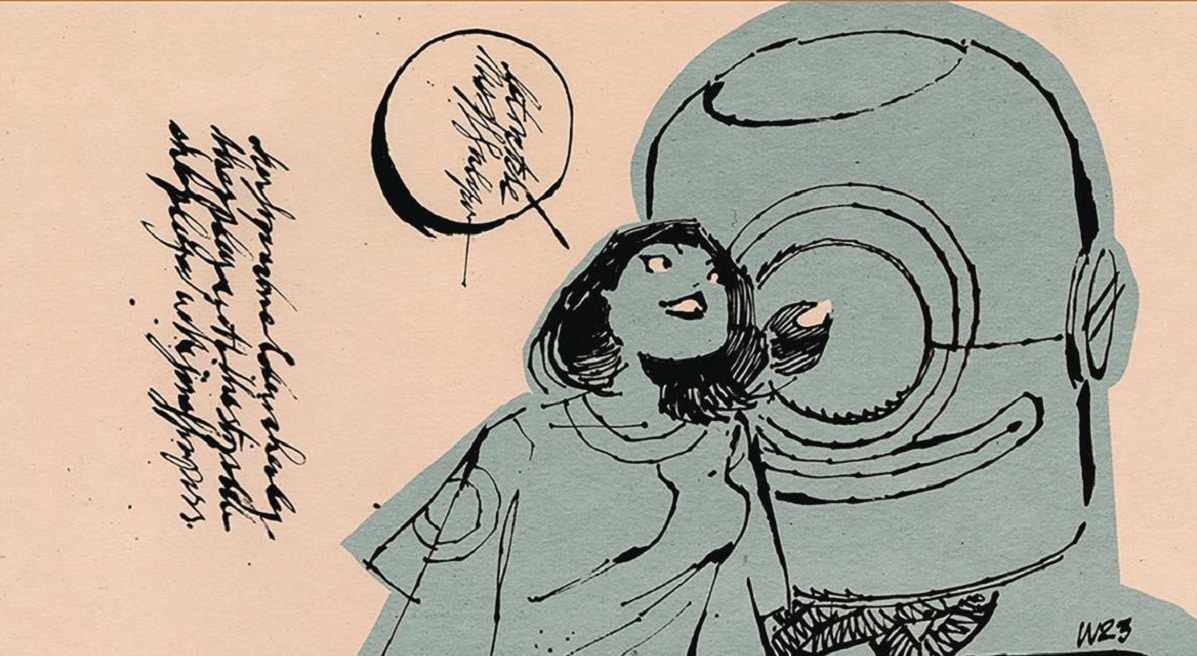The new Amazon Prime series Carnival Row takes a very different look at Victorian times in a world where humans and fantastical creatures interact, but the class system has clearly put the latter — referred to slurilly as “critch” — into the lower roles of servants and sex workers. Orlando Bloom of Lord of the Rings and Pirates of the Caribbean fame plays Inspector Rycroft Philostrate (or “Philo”) who is on a tough case involving murdered critch. Cara Delevingne (Suicide Squad) plays Vignette, Philo’s ex, a warrior-class fae who has come to town mostly looking for Philo but is immediately put into the menial role as a maid.
Just beneath that main storyline is another one involving wealthy brother and sister Ezra and Imogen Spurnrose, as played by Andrew Gower and Tamzin Merchant, whose world is turned upside down when a puck businessman named Argeus Astrayon (played by David Gyasi) moves into the large estate next door, causing various layers of interest and anger. All three actors have done quite a bit of TV before this, Andrew Gower having appeared on Outlander and Black Mirror, Gyasi on Doctor Who and Troy: Fall of a City, while Merchant was on Salem and Supergirl. In other words, all three had some fine genre TV credentials and cred before coming to Carnival Row.
The Beat got on the phone with the three actors, and though we didn’t get to ask too many questions, they certainly had a lot to say about the world of Carnival Row and their specific characters.
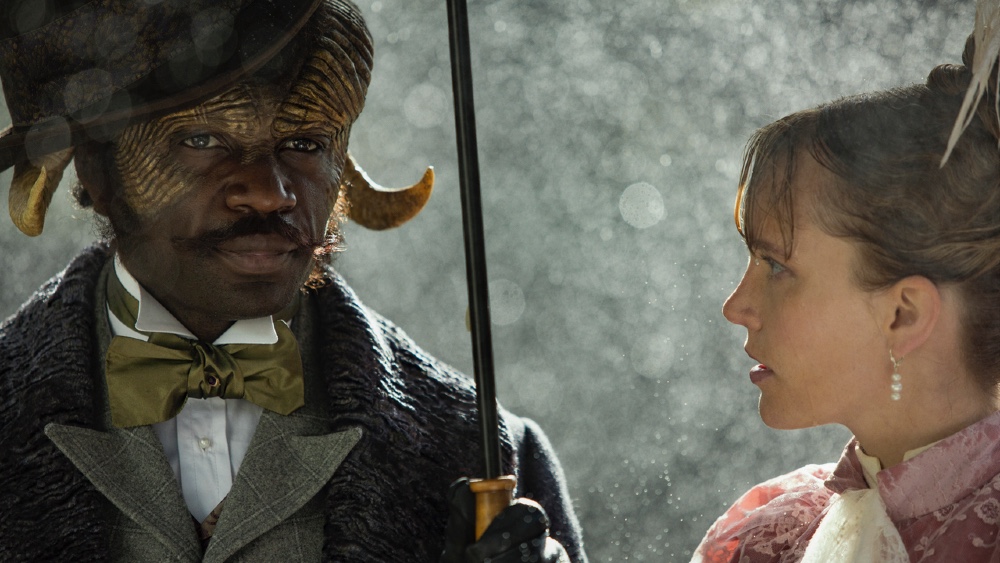
THE BEAT: All of you have quite a bit of television work under your belt, so what interested you in Carnival Row and the characters you’re playing?
David Gyasi: What interested me in particular was in one of the earlier drafts that I read — and the scene still remains — there was a scene where a young fae child washes up on a beach dead. At the time that I read it, that was happening in our newspapers. We had a young Syrian refugee wash up on a French beach dead. It was quite horrific, so that really stopped me in my tracks and made me think, “This is a show that I would love to be involved with,” so much so that I then rung my agent and said, “Really love the idea of being involved with this but tell me how did Hollywood react so quickly?”
She said, “I don’t know what you’re talking about ‘cause this script has been knocking around for ages.” I thought to myself, “Wow, that’s incredible that that’s still relevant,” and then I thought, “Actually, it’s quite sad, because it was relevant then and it would be relevant over the past 2,000 years.” That’s what hooked me with the script, and then I’ll let someone else talk.
Andrew Gower: Weirdly, I just said that to David and we realized that was one of the things that we shared, that image and stage direction of somebody washing up on the beach. Another thing that I’ll add to my reading of the script was that — especially growing up — the people that influenced me in life is strong, female characters. I read this script, and some female characters also have flaws and specifically the relationship between my character and his sister, it was that, and also, me seeing the likes of a character like Vignette.
I hadn’t read a script that has female characters so shaped and so formed and living and challenging the men in a Victorian period film is something that is really refreshing. I’ve got a niece, and I’ve got young females in my family. That sort of works for me right now as an actor who is attracted to those projects consistently, and that is the work I’ve done in the past and this specifically is the one that I went, “Ah, we’re dealing with female characters that we haven’t dealt with before, and I get to be in scenes with them.”
Tamzin Merchant: Something I really love about the show, that really struck me actually is the sense that you crash-land in the middle of history. You don’t start at the beginning. A lot of fantasy shows and fantasy in general — and I’m very much talking generally — it’s sort of a medieval approach to everything, and I really like the fact that in this show, it’s not like we’re discovering a new land, which is often how a fantasy story really happens. It’s like you’re in the land, and it’s a thousand years later after this has been discovered. It’s kind of been pillaged, and the fairy lands are caught up in wars between two different human factions. The industrial age is a fantasy rather than the kind of medieval origin story age that we’re used to seeing. I think seeing how an industrial age fantasy works is really interesting. You don’t just have that we’re meeting the elves for the first time. We’re not meeting the Pucks for the first time.
Gower: It’s not apologetic, isn’t it?
Merchant: Yeah… we crash-land in the middle of history, so it’s a thousand years after you meet the elves or the pucks or whomever. Of course, they’re the underdogs of society, then they’re going to be doing the shitty jobs in factories, and they’re going to be sex workers and those things. That’s really interesting to see a fantasy where it’s not about the wonder of the new, but it’s almost quite jaded. There is wonder there, but the humans are quite jaded about it, and they’re colonialists in the worst sense to the culture of the others that they encountered and conquered. That was interesting, I thought.
Gower: And with that, the show itself raises questions, rather than giving you too many answers. I think sometimes a show from the word “go” can try and give the audience answer, answer, answer, and this show raises questions on a massively broad society level and huge scope. The audience hopefully will be asking questions, and it gives the series scope to land in different pockets and explain things later on in Carnival Row, whenever that is.
THE BEAT: The show deals with a lot of things like xenophobia and classism. I wondered about approaching a show like this which is meant to be fantasy but deals with things that are going on in the real world today. How do you approach your characters with that in mind?
Gyasi: With care.
Merchant: Yeah, I think generally for me, I don’t have any acting training — I’m not a trained actor — but I think the approach is to play a character with honesty and with authenticity and a full version of themselves, rather than play a trope, if that makes sense. I think in that way that if you try to play the whole world in every sentence that you do. You sort of have to play the specificity of something, and that gives it meaning.
Gower: And we’re lucky that we’re in a society, specifically for me… or we’re not so unlucky, I should say, very unlucky that we’re in a society, my character, where ignorance does exist. Yes, this is its own entity and its own fantasy, but fundamentally, I can type in on the internet unfortunately and see ignorance on a day-to-day basis, characters who are ignorant to others, fearful of others, votes to leave because they’re terrified of people coming in their country. With that, you do approach the character, but you are surrounded with these emotions and feelings that are around some of us.
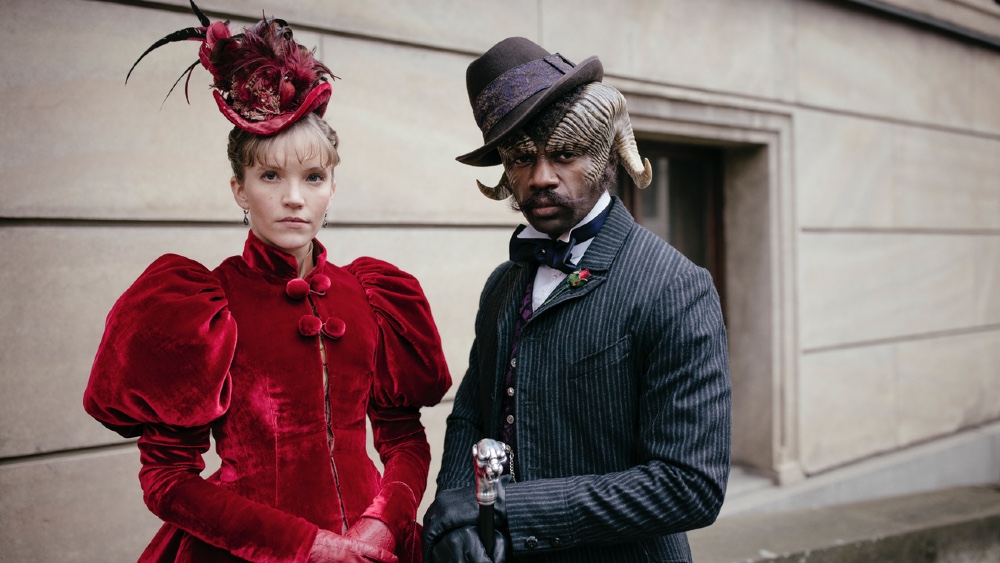
Gyasi: I was just going to ask… [to Gower] Do you think that Ezra willingly stays ignorant or does he fight stay ignorant? Or can he help that?
Gower: I look at it as a fear. I think a lot of people like to keep things out of how they are because they’re terrified of change. Why do you put a woman in a corset to stop her challenging you? Why do women and men sit in different rooms so they can’t gossip? I read this etiquette book to play Ezra and it was really helpful, because every time I was in a scene with my sister, she was breaking every etiquette rule in that book, so basically, that’s obviously going to make me angry because she’s not abiding… they were very strict [about] etiquette in Victorian society, as we all know. Touching your neck can mean something and wearing a specific collar can mean something. For me, that was really a clever period to face this, especially when David’s character turns up in our street. That wasn’t in the etiquette book.
Gyasi: Something else I’m trying to think about is how does one approach playing someone like Argeus? I think that essentially, with so much awe and excitement, because you’ve seen the first four episodes so you don’t get much of Argeus in the first three episodes. It meant that one, I was heavily intrigued by him but two, I needed to speak with the writers and the filmmakers really to understand where they were going to go with this character and what they wanted to do. I was really intrigued about this threesome here, about the dynamics of that would work. I was also a little bit scared of portraying this guy in the right way.
If you know anything about me, I don’t make decisions based on fear. In fact, it kind of drives me because I love the idea of the challenge. I grew to love my three-hour make-up sessions and five hours on a full day to get the make-up and three hours to get out. I think that’s interesting because actually, you have to really enjoy what you’re doing for that not to be a problem, and it really wasn’t a problem. I was intrigued by this character and still so intrigued.
I was actually over the moon when we were commissioned for a second season. I’m so excited about exploring this dynamic right here — the three of us — even more, and also discovering more about Argeus. Someone mentioned some of the stuff we’re going to explore, and again, it just blows my mind in, “How do we now tell that story?” It sort of answers that question and your first question, obviously. The world of Carnival Row absolutely hooked me, but then the character of Argeus really further drew me in.
THE BEAT: I was going to ask about Argeus’ make-up, actually. While your character doesn’t say a lot, he still has an imposing presence, at least in the episodes I’ve seen. How is that for you, David, and also for Tamzin working with him?
Gyasi: It’s really interesting that because Argeus is just someone who is living his life. He’s a businessman. He’s ambitious, and he is eloquent and articulate and thoughtful and all of these things, and aggressive and all of that sort of stuff, so he’s just living his life yet people conceive or interpret that to be aggressive or powerful or imposing. He’s literally just standing under an umbrella as people run from him. That’s quite nice to play that. When I was younger, I used to go into London and audition, and it was so interesting to me to learn about my city and learn about how people would react to me. If the audition would require me to wear a tracksuit, the way the ticket collector would speak to me and look at me was different to if my audition required me to wear a suit and tie. It’s so interesting. Same person. Different clothes. How did that work with you guys?
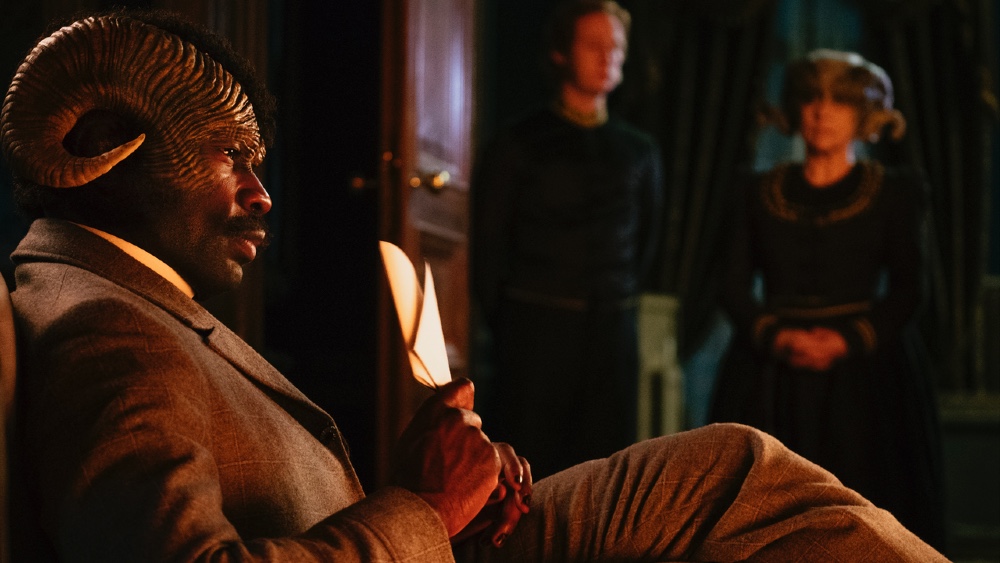
Merchant: I think there’s really something about your make-up. I obviously didn’t have to sit in the chair for three hours every morning, but the awesome thing is that everything you see on screen, I would be seeing in the room, so you are Argeus to me there, and it’s quite an astonishing look. To open the door and be faced with Argeus with horns and hat and hooves and everything, is a really … it kind of provokes a reaction, so you don’t have to act the reaction. You just have the reaction, and I would find myself just staring at you and your face and your horns and everything…
Gyasi: Are you quite bored looking at me now? [At this point, all three of them laugh and Andrew says something funny, but undiscernible under their laughter, about how disappointing they must be to each other without make-up. This gets them laughing even more. Obviously, they have had a very long press day.]
Merchant: But just having that all there and all real, there’s no CG or post for all of your looks, so it was really special to be able to just live it and to then concentrate just on the personal things that are going on between us.
Gower: Not to spoil anything but you haven’t gotten into the later episodes, but I’ve only had a few scenes with David, and one of the final scenes I filmed was a scene that you’ve seen it on the page and then you get it up, and there’s a point in the scene where we almost stand-off. For me, I don’t think Ezra Spurnrose has had a stand-off with a puck, basically, so that [make-up] did all the work for me, standing opposite from you. I instantly backed down, basically, because God knows would happen if I didn’t. I felt everything that you see in the scene.
All eight episodes of Carnival Row debut on Amazon Prime starting Friday, August 30. You can read Samantha Puc’s review of the series right here.


